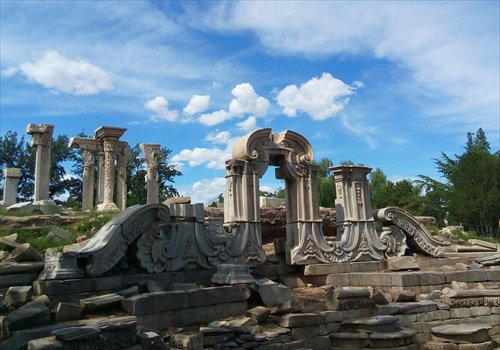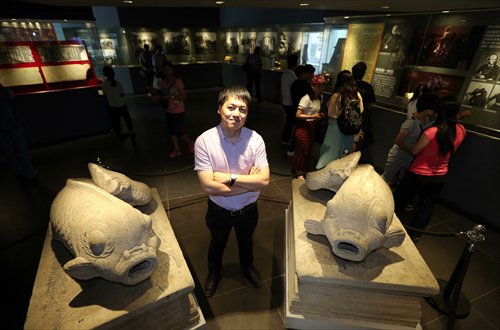Lone researcher goes on global search for lost relics

The Yuanmingyuan Park Photo: CFP

Liu Yang and the pair of stone fish he discovered Photo: Courtesy of Liu Yang
Liu Yang has become a name that one cannot help but mention when talking about the Yuanmingyuan. He has spent the last 12 years tracing its relics and has managed to track down nearly 1,000 pieces across the globe. In addition to writing books, he also found one of the only three sets of relics which have ever been returned.
Also known as the Old Summer Palace, the Yuanmingyuan was an imperial park that was looted and burned by Anglo-French allied forces during the Second Opium War in 1860. But the most pitiful thing of all, Liu believes, is the loss of thousands of relics. The whereabouts of most of them remains unknown this day.
Even though Liu works at the Yuanmingyuan, it is not his job to research relics. But he started his research on the day he began working there. "It is like working on a jigsaw puzzle. My goal is to piece together as many relics together as I can."
Liu is now writing books to summarize the fruits of his work and planning a trip overseas to trace more relics. But sometimes Liu feels lonely.
"Twelve years ago, when I started it, I felt thrilled that I was the only one dedicated to this field," Liu told the Global Times. "Now with no people joining me still, I feel sad. It needs collaboration."
Childhood dream
Working for the park was a dream Liu had since childhood and when it came true in 2004, he felt he could not ask for more from life.
A Beijing native in his 30s, Liu developed special feelings for the park when he was a 12-year-old. That summer, he wanted to visit the Summer Palace, but got on the wrong bus, which brought him to the Yuanmingyuan.
After seeing the ruins and learning how beautiful the park used to be, he was totally charmed by it and hoped to "go to the UK and France and get all the treasures back."
Liu then started to read about the park, trying to find the Yuanmingyuan's treasures, and sometimes published articles about it. So even though he majored in film and TV production, he landed at job at the Yuanmingyuan after graduating in 2004.
His dream had come true. But soon he learned that his job, which mainly consisted of writing introductions and checking the ruins, actually had little connection to what he really wanted to do. So he made "treasure hunting" his hobby. He worked like an academic researcher, finding clues from all kinds of materials, making analyses and carrying out field investigations.
This hunt has been expanding over the years, from Beijing to Hong Kong and even New York and Paris.
In 2013, he gathered together all the information about the Yuanmingyuan relics he had learned from museums, collectors, auctions and old pictures and published a book titled Who Collects Yuanmingyuan. In the book, he gives a list of 800 relics that he believes originated in the park, the first catalogue of the locations of the Yuanmingyuan relics ever written.
A solo journey
The thing that excited Liu most over the years is his role in returning a pair of stone fish to the park. According to Liu, it is one of only three sets of relics returned to the park in the past 150 years, with a million or so items still unaccounted for.
He found the fish by chance. In 2005, when Liu was writing a book about the old pictures of Yuanmingyuan, he noticed that the stone fish in one picture looked familiar. He looked again at the stone fish he filmed in a Beijing courtyard one year ago and discovered they were the same sculptures.
After further checks he became sure that they were indeed the pair from the Yuanmingyuan. Following negotiations, the fish eventually went back to the park in 2007.
But he never expected that the fish would land him in trouble that he has never been able to shake off. He became a thorn in the side of the leadership of the administration department he works in after accepting an unapproved media interview.
As Liu understands it, his decision to receive the interview, though not improper in itself, may have stopped some people from portraying the retrieval of the fish as their own achievement.
There has been a cost for Liu to shoulder. The sign next to the fish does not mention that he was involved in their retrieval. Since then, he has never been recognized as an outstanding staff member, or got a chance to take a work trip abroad.
"It is OK with me that they put me aside. It allows me more time to carry out my research into relics," said Liu.
"I don't want to get promoted. If I am a leader, I will not have enough time for tracing relics," said Liu.
His experience at his workplace is one reason why he feels so lonely in dedicating himself to this daunting job. "It is not a place for long-term accumulative research. It demands that you do something to get instant results," said Liu, adding that in China there is no special institution for Yuanmingyuan research yet.
Hard return
In the past several years, Liu has gone on "tracking" trips to museums in several countries that boast Yuanmingyuan relics. He has come to realize that foreign museums, particularly French and British ones, are rather sensitive about such relics.
"They would show me a lot of documents proving that they are legal when I ask about it," Liu said.
Liu revealed that there are lots of places that probably have Yuanmingyuan relics that he cannot afford to visit. He said due to the high cost of plane travel, hotels, picture books and other materials, his small salary is running out. He sometimes has to deliver lectures at universities or write articles to make extra money.
To Liu, the question of when the Yuanmingyuan can get these relics back is still one without an answer. In fact, among the relics he has found inside China, none of the owners, be they museums or universities, are willing to return them.
"They say they got them legally and paid for them, and they protect them very well at present," said Liu, "Foreign museums have the same reasons not to return them. It is almost impossible to rely on museums to return them. We probably can only rely on private donations."
Newspaper headline: Piecing a park together